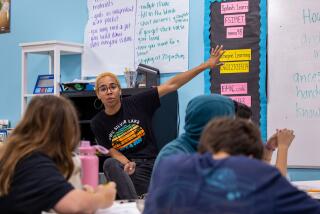With Grants, Teachers Can Be Scholars, Too
- Share via
Reading the obscure works of Stephen Crane is not everyone’s idea of a dream vacation.
But that is what Fairfax High School teacher Daniel Victor did last summer, to his great satisfaction.
Victor and four other Los Angeles-area high school teachers did not have to teach summer school this year. They were paid to pursue their academic passions as winners of national fellowships that allowed them to do the sort of scholarly work usually associated with college-level teaching.
The five were among 150 recipients nationwide of fellowships for independent study in the humanities, a program administered by the Council for Basic Education in Washington.
With $3,000 stipends, provided by the National Endowment for the Humanities and others, the local teachers were able to read to satiety on a favorite subject, without guilt and without missing a mortgage payment.
Their projects, all approved by panels of experts, varied.
For example, while Victor traced ambivalence toward social class through the works of Stephen Crane, Mark Twain and others, Studio City teacher Ellen Samsell studied creative women in the books of Willa Cather.
Ted Carothers of Temple City High School spent day after day in the Huntington Library reading about Homer and Bronze Age Greece.
According to the five local recipients, the summer fellowship was more than a rare opportunity to indulge a scholar’s notion of a good time by learning as much as possible on a topic of choice.
The award, they said, also sent them back to their classrooms with a renewed commitment to teaching. And it gave each of them a satisfying sense--for some, a first-time sense--that they were being recognized as genuine scholars, something high school teachers are rarely thought to be.
According to a fellowship administrator, these emotional fringe benefits are precisely what the grant program is designed to produce. The only way to ensure excellence in teaching is to get excellent teachers into the classroom and keep them there, the Council for Basic Education’s Betty Berkow said.
Boost to Self-Esteem
Berkow said enhanced self-esteem and job satisfaction are often reported by fellowship winners. “I wish they had had the program when I was teaching,” she said.
As fellowship recipient Samsell, who teaches advanced English courses at Our Lady of Corvallis High School, said, teaching high school is not exactly a glamour profession.
“If you go to law school, you have instant recognition,” said Samsell, 35. “But when you tell people you’re a teacher they are not impressed.”
Samsell, who has a doctorate in English and American studies from Indiana University, said she often finds herself justifying her choice of profession to puzzled strangers.
“People are constantly saying to me, ‘Why are you teaching high school with a Ph.D.?’ ” Samsell said. “I tell them I love it. And I also tell them that getting a university teaching job someplace other than Alabama, Georgia or North Dakota isn’t easy,” she said.
Satisfying Pursuit
Samsell found her reading of Willa Cather even more satisfying than writing her dissertation on 19th-Century American realism.
“I love teaching,” she said. “But when I do this it reminds me just how much I love to work in a library on my own, how much I love to study.”
Victor’s project grew out of his doctoral dissertation on David Graham Phillips, a turn-of-the-century social critic whose impassioned prose prompted a sputtering Teddy Roosevelt to term him a muckraker.
This summer Victor, 42, looked at the contradiction in the lives and works of Phillips, Mark Twain and Stephen Crane, all of whom were both social critics and social climbers. (As Victor pointed out, Crane, who wrote eloquently of the American poor, spent his final days as a pate de foie gras-eating dandy on a British country estate.) Victor said he encourages his students to analyze literary works in terms of such powerful opposing forces.
Rare Book Purchased
Victor’s fellowship allowed him a few academic luxuries, such as a $25 copy of the hard-to-find novel Crane was working on at his death, “The O’Ruddy.”
The opportunity to study Twain in depth has enhanced an advanced-placement course Victor teaches that deals extensively with Twain’s work, he said. But Victor said he especially valued the grant’s implicit acknowledgement that a high school teacher’s intellectual interests could be worthy of support.
“In addition to everything else, these things honor us as intelligent people,” he said.
Like many others, Victor sees such programs as a healthy corrective to the popular notion that anyone who can stand upright can teach.
“People think it’s just a matter of getting up in front of a class and talking,” he said. “It’s not. Just because people have flown in an airplane doesn’t mean they can tell the pilot how to fly.”
Mental Well-Being Helped
In the report Victor filed after his summer of study, he described the fellowship as “a most worthwhile and needed supplement not only to the relatively low salaries of teachers but also to their mental and spiritual well-being.”
One of the things Victor liked was that the recipients were given their stipends at the beginning of the summer.
That may sound like a minor amenity, but administrator Berkow said that many recipients (just over 500 since the program began in 1983) praise this aspect of the program.
The teachers said they appreciate being treated as trustworthy adults, she said, apparently because that is not always the way they are treated in their schools and other settings.
“We give them the money up front,” Berkow said. “They’re not on a line of credit or a weekly budget.”
$200 Earmarked for Books
Of the $3,000 each receives, $2,800 is a grant to the winner and $200 is earmarked for books for his or her school library. Victor discussed what to buy with his students and the Fairfax librarian before purchasing eight volumes of the definitive editions of major American writers in the Library of America series. Victor’s wife and Fairfax colleague, Norma Silverman, did original calligraphic bookplates for the volumes, now available in the school library.
“Academically, it was the No. 1 experience of my life,” Ted Carothers, 57, said of his summer grant. Carothers, who has been a social science teacher at Temple City High School for 25 years, said he became enthralled with the archeology and anthropology of Bronze Age Greece 20 years ago and has not fallen out of thrall since.
“I would be doing this even if I didn’t have grants,” said Carothers, who once treated himself to a $10,000 tour of the major Bronze Age sites in Greece.
‘A Lifetime Study’
Carothers’ grant allowed him to read more about Homer’s epics, “The Iliad” and “The Odyssey.”
“Just these two books are a lifetime study,” he said. “It would be presumptuous of me to think I could read all that’s been written about them. But I made a good beginning.” Carothers spent much of his time in the hushed atmosphere of the Huntington Library, studying Homeric references in the library’s rare books.
“You feel as if you’re on hallowed ground,” Carothers said of the Huntington. He felt especially privileged to work there because, he said, “I’m a high school teacher and most of the people up there are college people.”
Fellow Mary Brackenhoff, who teaches English at the Marlborough School in Hancock Park, used her grant to fill a gap in her literary education by reading books by British and American women writers.
Brackenhoff, 36, said women’s literature is of special interest to many of her students, all girls.
Second-Rate Writing
Brackenhoff said she made some wonderful discoveries, such as the novels of Shirley Ann Grau, whose books she now teaches.
She also found a vast amount of second-rate writing by women. The Jane Austens are few, she discovered, speculating that historical inequities in education for women may have hurt them as writers.
“I had always objected to the way women were left out of literature courses,” she said. “Now I understand. In fact, I would leave many of them out, too.”
Brackenhoff has a Ph.D. from the University of Nebraska, where she wrote a dissertation on the novels of Saul Bellow (she has a T-shirt emblazoned with “For Whom the Bellow Tolls”).
“People in Nebraska couldn’t believe I’d come here and get a job in a high school,” she said. Brackenhoff applied for 50 college teaching jobs before responding to Marlborough’s ad in the Chronicle of Higher Education. “I went into the job somewhat cynical but now I’m a cheerleader.”
She Read at Beach
Brackenhoff did some of her summer reading at the beach and some while waiting for her 6-year-old son to finish his tennis lessons.
She said such fellowship programs are especially important to teachers.
“We expect so much from our teachers,” she said, “but we don’t give them enough positive strokes. We don’t express our appreciation of what they do.”
Marlborough headmaster Robert A. Chumbook said the school “revelled” in Brackenhoff’s fellowship.
Marlborough wants its teachers to do academically oriented, personally satisfying things in the summer, Chumbook said, which is why the school instituted its own program of summer grants for teachers a decade ago.
Chumbook said that the school actively seeks highly qualified, highly credentialled faculty, such as Brackenhoff. Since the private school is unable to pay as much as most public schools, it must reward its teachers in other ways, he said.
“We feel we can keep these young Ph.Ds because we allow them to do the things that are important to them professionally,” Chumbook said.
Like Brackenhoff, fellowship recipient Heath Moon is a Ph.D. who never imagined he would teach anywhere but college.
Moon, 44, who is dean of faculty at Pilgrim School in Central Los Angeles, is also a working scholar. His publications include four articles on the work of Henry James.
‘Financial Goodies’
“I think that it’s sad that grants of this kind have gone almost exclusively to university faculty,” Moon said. “High school teachers have been left out of the whole world of scholarships and the handing out of these financial goodies for academic research.”
Moon speculated that that will change as more and more Ph.Ds drop out of the scramble for a small number of college jobs and teach elsewhere.
Moon’s summer project was to analyze a number of books he doesn’t much like.
“I’m interested in the underlying political ideas that are implicit in books like ‘Catcher in the Rye,’ ‘One Flew Over the Cuckoo’s Nest’ and Arthur Miller’s ‘Death of a Salesman,’ ” Moon said. “When these books are taught, these moral and political values are often taken for granted. They are values that I frankly find distasteful.”
All these works contain rather juvenile, simplistic analyses of complex issues, in his view.
A Political Allegory
As an example, he pointed to Ken Kesey’s “One Flew Over the Cuckoo’s Nest.”
That book, he said, is a “transparent political allegory about the rebel in a repressive, fascistic society.”
“I find it childish,” Moon said. “And I think that’s precisely why kids love it--because it presents a childish political view.”
Moon said the fellowship gave him an opportunity to delve deeply into a subject he might never have explored so thoroughly otherwise.
Indeed, the only flaw in the program, he and several other recipients indicated, is that it runs out while there are still so many books to be read, so many ideas to develop.
“My dream,” Moon said, “is to get a grant for a year so I can write a book on Henry James.”
More to Read
Sign up for Essential California
The most important California stories and recommendations in your inbox every morning.
You may occasionally receive promotional content from the Los Angeles Times.










